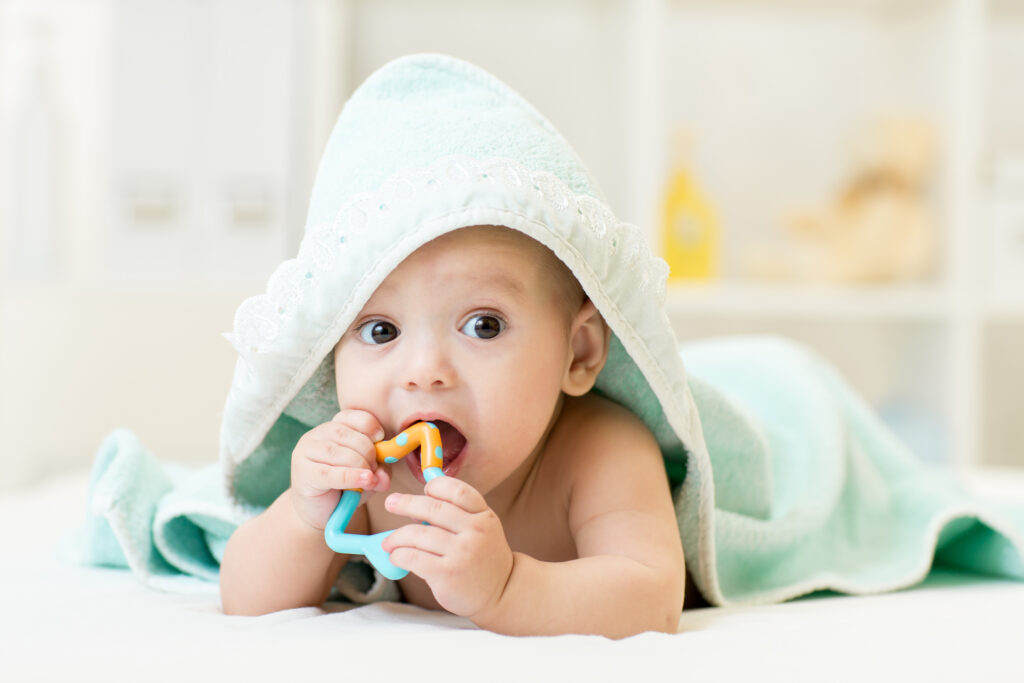When Do Babies Start Teething?

When your baby starts teething, it can be an exciting milestone. Those first teeth are not only adorable, they will eventually help your baby chew foods and speak clearly. Unfortunately, it’s often an uncomfortable process when babies start getting teeth. To make matters worse, the teething process is different for every baby, so it is not always easy to tell when babies start cutting teeth.
In this article, we will address the following questions:
- When do babies usually start teething?
- How soon can a baby start teething?
- What are signs of teething?
- Is fever a sign of teething?
- How can I relieve my baby’s teething pain?
- What teething pain remedies should I avoid?
- What should I do when my baby starts teething?
When Do Babies Usually Start Teething?
It really varies in terms of when babies start getting teeth; there is no one “normal” age at which the first tooth emerges. Some babies are born with teeth while others don’t see a single tooth until after their first birthday.
That said, many children get their first tooth between ages six and ten months. Typically, the lower central incisors (the two front teeth on the bottom) are the first to erupt (i.e., break through the gums). Most children will have their full set of primary teeth by age three.
How Soon Can A Baby Start Teething?
Okay, so many children start teething between six and ten months, but how soon can a baby start teething? Can a baby start teething too early?
A baby can start teething at any point. A baby’s first tooth can erupt before the baby is even born (natal tooth), during the first 30 days after birth (neonatal tooth), or at any time after that.
Teething before six months typically is not a cause for concern. However, when a baby’s teeth come in significantly earlier than six months, the teeth and/or roots can sometimes be underdeveloped. In some cases, teeth that erupt very early have enamel defects, making them especially susceptible to cavities. (To learn more about other potential complications that can arise when teeth erupt very early, see our article on natal and neonatal teeth.)
If your baby starts teething very early, or if you have any concerns about your baby’s teeth when they begin erupting, it’s a good idea to speak with a pediatric dentist. Your child’s dentist can teach you how to properly care for the teeth and help you determine whether your baby could benefit from fluoride treatments to help strengthen any defective dental enamel.
What Are Signs of Teething?
Given the wide variability in when babies start getting teeth, how can parents tell if their babies are teething? The truth is that it can sometimes be difficult to know for sure.
Classic signs of teething include the following:
- increased drooling,
- increased desire to chew or bite on objects,
- irritability/fussiness,
- difficulty sleeping,
- refusing to eat,
- sore or tender gums, and
- rubbing the cheeks and/or gums.
Note that some of these teething symptoms are easily confused with normal parts of early childhood development that are unrelated to teething. For example, “mouthing” – that is, babies sticking objects inside their mouths – is a natural way for babies to explore and learn about the objects around them, but can sometimes be difficult to distinguish from a desire to chew on objects to relieve teething pain.
Others of these teething symptoms, such as irritability and refusal to eat, could be signs of potentially serious medical issues wholly unrelated to teething. If your child experiences persistent discomfort and none of the techniques described below provides relief, or if you otherwise feel concerned, it is a good idea to check in with your child’s pediatrician.
Is Fever A Sign of Teething?
Although fevers have sometimes been anecdotally reported as a sign of teething, the American Dental Association does not consider them to be a normal teething symptom. The same goes for diarrhea. If your child is experiencing diarrhea or a fever of 100.4 degrees Fahrenheit or higher, you should contact your child’s pediatrician.
How Can I Relieve My Baby’s Teething Pain?
Counterpressure is one of the best ways to relieve the soreness caused by the soon-to-emerge teeth pressing against your child’s gums. If your child experiences discomfort when he or she starts cutting teeth, try applying counterpressure by
- gently rubbing your child’s gums with a clean finger, or
- allowing your child to chew on a dry washcloth or teething toy (preferably one made from solid rubber or food-grade silicone).
If you decide to use a washcloth or teether, you can try chilling it before giving it to your baby, as cold temperatures are another good way to provide relief for sore gums.
If applying counterpressure does not appear to help make your baby more comfortable, it is a good idea to speak with a pediatric dentist or your child’s pediatrician to make sure teething is the true cause of the discomfort.
What Teething Pain Remedies Should I Avoid?
We strongly discourage the following teething pain remedies:
- Homeopathic teething tablets. The FDA has warned consumers that homeopathic teething tablets containing belladonna, such as those marketed by CVS and Hyldand’s Inc., pose an unnecessary risk to infants and children. Belladonna, also known as Deadly Nightshade, is a toxic plant. It can cause symptoms such as fast heart rate, seizures, difficulty breathing, agitation, disorientation, and hallucinations.
- Teething gels and creams containing benzocaine or lidocaine. Benzocaine is a local anesthetic used in teething creams and gels such as Orajel. The FDA has urged parents not to use topical teething medications containing Benzocaine because of the risk of methemoglobinemia, a serious – and potentially fatal – condition that affects the blood cells. Lidocaine viscous is a prescription local anesthetic used to numb the mouth and throat. The accidental ingestion of too much lidocaine by infants or young children can result in seizures, severe brain injury, heart problems and death. As a result, the FDA has warned that viscous lidocaine should not be used to treat infants or children with teething pain.
- Liquid-filled teething rings. These teething rings may break open and release liquid into your child’s mouth. Exactly how harmful this is depends on a number of factors, including what type of liquid the manufacturer used to fill the ring and whether the liquid is contaminated with any bacteria. We recommend avoiding the risk altogether by sticking to teething rings made of solid rubber or food-grade silicone.
- Teething necklaces and bracelets. The FDA has warned that teething jewelry poses serious risks, including choking, strangulation, mouth injuries and infection.
- Teething biscuits. Teething biscuits typically contain sugar or other fermentable carbohydrates (sugary or starchy foods that break down into sugars inside the mouth), which can lead to cavities.
What Should I Do When My Baby Starts Teething?
As soon as babies start getting teeth, they can start getting cavities, so make sure to begin brushing your baby’s teeth daily as soon as they emerge. (See our post on brushing babies’ teeth for tips on how to do so.)
It’s also time to start thinking about scheduling your baby’s first dental checkup. The American Academy of Pediatric Dentistry recommends bringing your child to see a pediatric dentist as soon as the first tooth emerges or by your child’s first birthday (whichever comes first). Surprised? See our article on when to make your child’s first dental appointment to learn more.
Why Should I Choose Hurst Pediatric Dentistry?
Dr. Lin is a board-certified pediatric dentist who has significant experience working with babies and helping to make their dental checkups fun. When your baby starts getting teeth, Dr. Lin can clean and examine your baby’s teeth and teach you how to care for them properly. He can also discuss strategies for alleviating teething pain and discomfort. Contact us today at (817) 510-6400 to schedule your baby’s first dental checkup.
Hurst Pediatric Dentistry is located in Hurst, TX, and provides teething advice and dental checkups for babies in the DFW area.
This article is intended to provide general information about oral health topics. It should not be used to diagnose or treat any medical condition or as a substitute for the advice of a healthcare professional who is fully aware of and familiar with the specifics of your case. Always seek the advice of your dentist or other qualified healthcare provider with regard to any questions you may have relating to a medical condition or treatment.
MEDICALLY REVIEWED BY:
Dr. Jin Lin

Dr. Jin Lin is a board-certified pediatric dentist with a passion for helping children achieve healthier, more beautiful smiles. He earned his Bachelor of Science degree from Cornell University and his Doctor of Dental Medicine (D.M.D.) degree from the Harvard School of Dental Medicine. After graduating cum laude from dental school, he completed his post-doctoral pediatric dentistry training at Boston Children’s Hospital and the Harvard School of Dental Medicine, where he served as chief resident and worked with children with a wide variety of special medical and dental needs, including children with rare syndromes.

